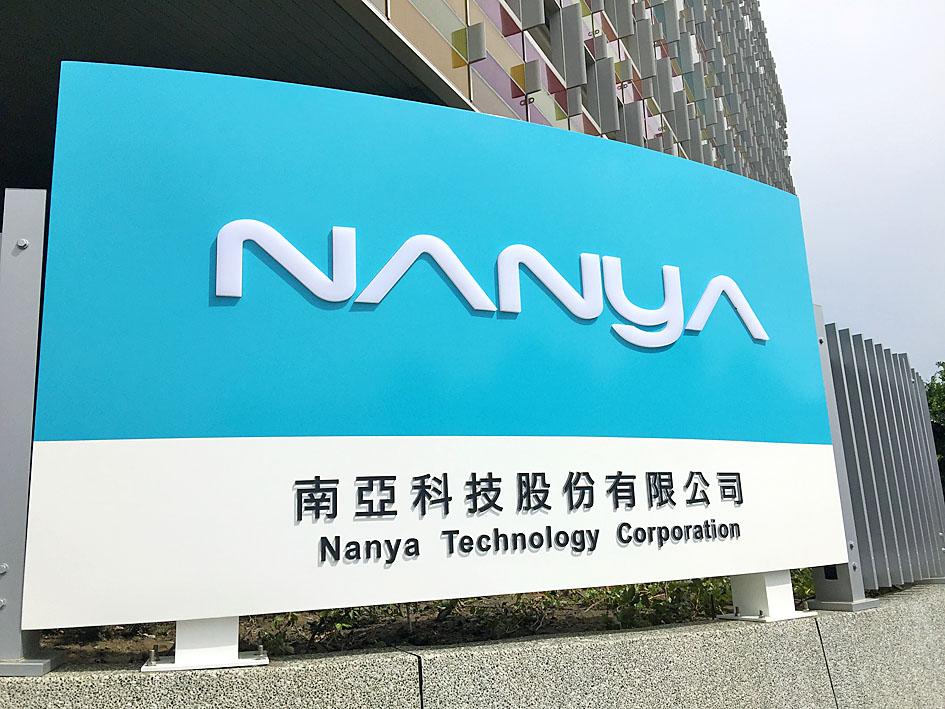Nanya Technology Corp (南亞科技) yesterday said that the memorychip industry is heading into a moderate correction period through early next year after a booming third quarter, during which its net profits almost quadrupled from a year earlier.
The nation’s biggest DRAM chipmaker expects the latest downturn would be short-term on the back of a slim inventory of chip supplies and relatively robust demand from servers, commercial computers and high-end consumer electronics such as smart speakers and networking devices.
However, an uneven supply of key components could cut into their growth, the chipmaker said.

Photo: Hung Yu-fang, Taipei Times
“This is not the winter for DRAM [companies],” Nanya Technology president Lee Pei-ing (李培瑛) told a virtual media briefing.
“The industry is entering a correction period in the fourth quarter and will be in place in the first quarter next year, but it will not last long and will not be as dramatic as it was in 2017, or 2018,” Lee said.
For Nanya Technology, revenue this quarter might slowly return to the level between the third quarter and second quarter, Lee said.
That was a downgrade from an estimate of flat or mild growth three months ago, he said.
The chipmaker expects prices to drop sequentially this quarter, while shipments remain little changed.
Nanya Technology yesterday scaled back its capital expenditure budget for this year to NT$12 billion (US$427.87 million) from an earlier estimate of NT$15.6 billion, due to a delay in equipment payments.
During the previous downcycle, most memorychip makers managed to make a small profit during the chilly seasons, which was different from the industry slump five or 10 years ago that pushed almost all memorychip suppliers into a crisis, Lee said.
It is a different situation this time, as most DRAM suppliers have seen their inventory fall to an extremely low level, or have leveled off all inventory, Nanya Technology said.
By application, Chromebooks showed some weakness as a rush by consumers approaches its end, it said.
Demand for automotive and industrial devices is also declining amid a scarcity of chips, mostly made with 8-inch wafers including power management ICs, driver ICs and audio ICs, Nanya Technology said.
A surprise halt in electronics production at factories in Malaysia, Vietnam and other Southeast Asian countries due to COVID-19 restrictions further curtailed memorychip demand, it said.
Nanya Technology saw net profit soar last quarter to NT$7.53 billion, compared with NT$1.61 billion in the third quarter last year. That represented quarterly growth of 22 percent from NT$6.16 billion.
Earnings per share jumped to NT$2.44 last quarter, from NT$0.53 a year earlier and NT$2 in the prior quarter.
A 20 percent price hike helped boost gross margin to 49.2 percent last quarter from 42.3 percent in the second quarter. Gross margin stood at 25.9 percent one year earlier.
Commenting on the US’ latest efforts to boost chip supply chain transparency, Nanya Technology said it would not release customers’ confidential information.

Three experts in the high technology industry have said that US President Donald Trump’s pledge to impose higher tariffs on Taiwanese semiconductors is part of an effort to force Taiwan Semiconductor Manufacturing Co (TSMC, 台積電) to the negotiating table. In a speech to Republicans on Jan. 27, Trump said he intends to impose tariffs on Taiwan to bring chip production to the US. “The incentive is going to be they’re not going to want to pay a 25, 50 or even a 100 percent tax,” he said. Darson Chiu (邱達生), an economics professor at Taichung-based Tunghai University and director-general of

‘LEGACY CHIPS’: Chinese companies have dramatically increased mature chip production capacity, but the West’s drive for secure supply chains offers a lifeline for Taiwan When Powerchip Technology Corp (力晶科技) entered a deal with the eastern Chinese city of Hefei in 2015 to set up a new chip foundry, it hoped the move would help provide better access to the promising Chinese market. However, nine years later, that Chinese foundry, Nexchip Semiconductor Corp (合晶集成), has become one of its biggest rivals in the legacy chip space, leveraging steep discounts after Beijing’s localization call forced Powerchip to give up the once-lucrative business making integrated circuits for Chinese flat panels. Nexchip is among Chinese foundries quickly winning market share in the crucial US$56.3 billion industry of so-called legacy

Hon Hai Precision Industry Co (鴻海精密) is reportedly making another pass at Nissan Motor Co, as the Japanese automaker's tie-up with Honda Motor Co falls apart. Nissan shares rose as much as 6 percent after Taiwan’s Central News Agency reported that Hon Hai chairman Young Liu (劉揚偉) instructed former Nissan executive Jun Seki to connect with French carmaker Renault SA, which holds about 36 percent of Nissan’s stock. Hon Hai, the Taiwanese iPhone-maker also known as Foxconn Technology Group (富士康科技集團), was exploring an investment or buyout of Nissan last year, but backed off in December after the Japanese carmaker penned a deal

WASHINGTON POLICY: Tariffs of 10 percent or more and other new costs are tipped to hit shipments of small parcels, cutting export growth by 1.3 percentage points The decision by US President Donald Trump to ban Chinese companies from using a US tariff loophole would hit tens of billions of dollars of trade and reduce China’s economic growth this year, according to new estimates by economists at Nomura Holdings Inc. According to Nomura’s estimates, last year companies such as Shein (希音) and PDD Holdings Inc’s (拼多多控股) Temu shipped US$46 billion of small parcels to the US to take advantage of the rule that allows items with a declared value under US$800 to enter the US tariff-free. Tariffs of 10 percent or more and other new costs would slash such